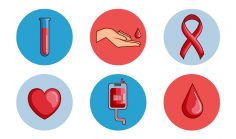Proper nutrition is achieved through the consumption of a diet that properly balances key nutrients including vitamins, minerals, carbohydrates, proteins, fats, and water. When the body receives the proper balance of nutrients, it is best able to function at its ideal level.
The US government issues guidelines on what constitutes a healthy diet and proper nutrition, and you can find diet or food related articles on nearly every website you visit however, many Americans still find it quite difficult to find the perfect balanced diet. Much of this difficulty is grounded in the fact different bodies metabolize foods in different ways, meaning that there is no one, universal ‘healthy’ diet. Finding your healthy diet requires finding what balance of food and exercise works for you.
Why Does Healthy Eating Matter?
The body needs proper nutrition in order to best function at its optimal level. Nutritional deficiencies (not getting enough of certain nutrients) can lead to various health problems, including:
- Anemia, which can be caused by a lack of blood iron
- Weakness
- Fatigue
- Vision Problems
- Digestive Upset
- Skin rashes
Alternatively, consuming too many calories can cause a person to become overweight or obese. This can also lead to a number of health problems, including:
- High blood pressure
- High cholesterol
- Diabetes
- Physical immobility
- Sleep apnea
- Heart Disease
- Stroke
- Liver and gallbladder disease
More than one-third (over 78 million) of American adults are obese. Obesity rates have increased significantly in recent decades. Over the past 35 years, obesity rates have more than doubled. The increase in obesity rates comes hand in hand with a growing processed and fast food industries as well as a nationwide decrease in physical activity.
What Does it Mean to Be Obese / Overweight?
Overweight and obesity are generally determined by a person’s body mass index or BMI, which compares height and weight to provide an estimate of total body fat. A body mass index of 25-29 indicates an overweight category and a body mass index of 30 or greater indicates obesity. Though body mass index is generally used as an indicator of body ma, it is not a perfect measurement. It does not take into account many different factors, including bone density or muscle mass, which may affect a person’s weight in relation to body fat percentage.
For more information on obesity, visit the Obesity Condition Center.
Where to Start with Healthy Eating
Though there is no one diet that is right for everyone, the following steps can help you get started on your path to healthy eating:
- Aim for a balance of key nutrients including, carbohydrates, proteins, fats, vitamins, minerals, and water. Other nutrient groups, such as sugars and oils, should be eaten in smaller quantities along with the others.
- Watch portion sizes. The quantity of food eaten is key to a healthy diet. Eating large quantities of otherwise healthy foods may still be detrimental. The same goes for eating small quantities of otherwise unhealthy foods. Portion sizes should find middle ground.
- Remember that moderation is key. Cutting foods entirely out of your diet can lead to binge eating and other forms of compensation. All foods can be eaten in moderation – just make sure to place a focus on fresh vegetables, lean proteins, and whole grains.
- Make changes, have fun with healthy eating. Don’t get stuck in a routine of eating the same foods. Tying new foods can help keep your diet interesting and ensure that you get a variety of nutrients.
- Exercise regularly. Though it may seem unrelated, physical activity can have a large influence over a person’s diet. Regular exercise helps to cut down extra weight and can encourage healthy eating choices.
Healthy Eating and Weightloss
It’s important to note that healthy eating is not solely about weight loss. While weight loss can be an effect of healthy eating (if a person has excess weight to lose), there are many other benefits to a healthy diet that do not involve losing weight.
Millions of Americans “diet” each year, meaning they set aside a period of time where they make a concentrated effort to watch their food intake and lose weight. However approximately 95% of dieters gain the weight that they lose back, mainly because the changes they make are temporary. “Healthy eating” implies more of a lifestyle change than a temporary diet, and is less focused on losing weight and more on improving general health.
Speak with your doctor to determine whether or not you should consider losing weight.
Staying on Track
Staying on track after you’ve made the decision to start eating healthily can be the most difficult part of healthy eating. The following are tips to keep you from falling back into old habits:
- Identify your eating patterns. Learn what you eat and why. Identifying causes for unhealthy eating can help you better find a long-term solution. This may involve keeping a food journal or keeping track of meals.
- Offer to cook meals for your partner or family if you are not the one who normally does the cooking. Being in control of the ingredients and portions of the food that you eat at each meal can help you make healthy decisions.
- Get friends and family on board. No matter how independent you may consider yourself, the people around you can still influence your food choices. Persuade your friends and family to join you in your goal of healthy eating.
- Work healthy eating into your routine. Making healthy eating routine is key to long lasting change. Even something so simple as choosing oatmeal and a banana over an bacon egg and cheese sandwich for your go-to breakfast on the go can make a difference in the long run.
- Appreciate the food that you eat. Do your best to make each meal special. Eat a variety of colors and textures. If you can, avoid eating in the car, on the go, or in front of the television.
Fitness
In addition to healthy eating, regular exercise helps contribute to a healthy lifestyle. The benefits of exercise are plenty, including:
- Weight loss
- Weight maintenance
- Stress relief
- Building strong bones and muscles
- Decreasing the risk of heart attack, stroke, and other illnesses
The National Institute of Health recommends 30 to 60 minutes of moderate aerobic exercise (moderate walking, cycling, jogging, yoga, stair-climbing, etc.) 5 or more days a week.
Certain existing conditions can make exercise potentially harmful. Check with your doctor before engaging in moderate to strenuous activity to assess your risk of complications.











